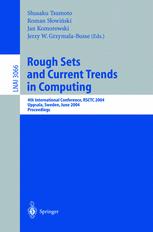

Most ebook files are in PDF format, so you can easily read them using various software such as Foxit Reader or directly on the Google Chrome browser.
Some ebook files are released by publishers in other formats such as .awz, .mobi, .epub, .fb2, etc. You may need to install specific software to read these formats on mobile/PC, such as Calibre.
Please read the tutorial at this link: https://ebookbell.com/faq
We offer FREE conversion to the popular formats you request; however, this may take some time. Therefore, right after payment, please email us, and we will try to provide the service as quickly as possible.
For some exceptional file formats or broken links (if any), please refrain from opening any disputes. Instead, email us first, and we will try to assist within a maximum of 6 hours.
EbookBell Team

4.7
16 reviewsIn recent years rough set theory has attracted the attention of many researchers and practitioners all over the world, who have contributed essentially to its development and applications. Weareobservingagrowingresearchinterestinthefoundationsofroughsets, including the various logical, mathematical and philosophical aspects of rough sets. Some relationships have already been established between rough sets and other approaches, and also with a wide range of hybrid systems. As a result, rough sets are linked with decision system modeling and analysis of complex systems, fuzzy sets, neural networks, evolutionary computing, data mining and knowledge discovery, pattern recognition, machine learning, and approximate reasoning. In particular, rough sets are used in probabilistic reasoning, granular computing (including information granule calculi based on rough mereology), intelligent control, intelligent agent modeling, identi?cation of autonomous s- tems, and process speci?cation. Methods based on rough set theory alone or in combination with other - proacheshavebeendiscoveredwith awide rangeofapplicationsinsuchareasas: acoustics, bioinformatics, business and ?nance, chemistry, computer engineering (e.g., data compression, digital image processing, digital signal processing, p- allel and distributed computer systems, sensor fusion, fractal engineering), de- sion analysis and systems, economics, electrical engineering (e.g., control, signal analysis, power systems), environmental studies, informatics, medicine, mole- lar biology, musicology, neurology, robotics, social science, software engineering, spatial visualization, Web engineering, and Web mining.